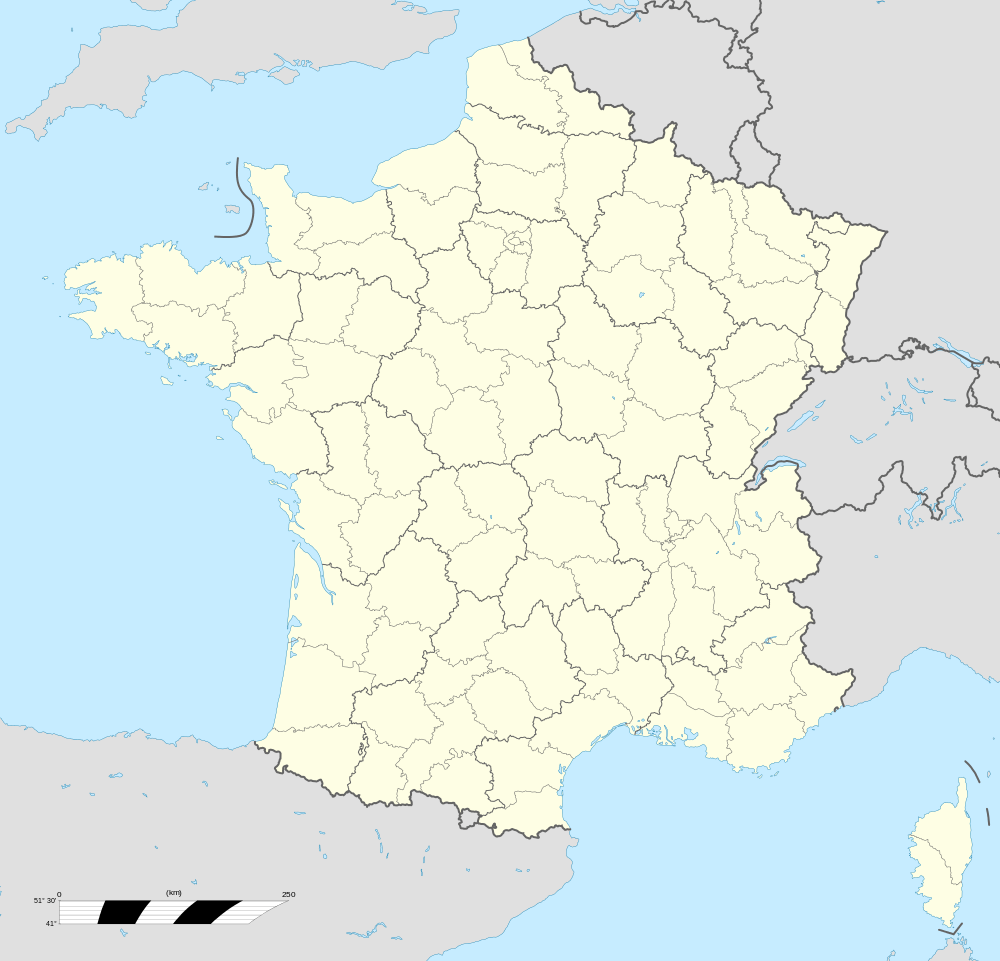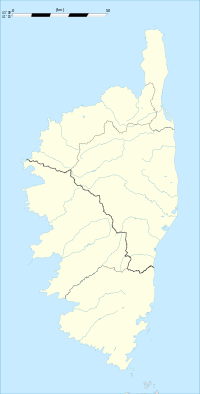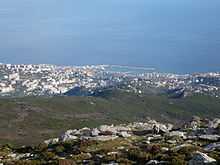Bastia
| Bastia | ||
|---|---|---|
|
View of St Jean Baptiste Cathedral from Bastia Port | ||
| ||
 Bastia | ||
|
Location within Corsica region  Bastia | ||
| Coordinates: 42°42′03″N 9°27′01″E / 42.7008°N 9.4503°ECoordinates: 42°42′03″N 9°27′01″E / 42.7008°N 9.4503°E | ||
| Country | France | |
| Region | Corsica | |
| Department | Haute-Corse | |
| Arrondissement | Bastia | |
| Intercommunality | Bastia | |
| Government | ||
| • Mayor (2014–2020) | Gilles Simeoni | |
| Area1 | 19.38 km2 (7.48 sq mi) | |
| Population (2008)2 | 43,477 | |
| • Density | 2,200/km2 (5,800/sq mi) | |
| INSEE/Postal code | 2B033 / 20200 | |
| Elevation |
0–963 m (0–3,159 ft) (avg. 30 m or 98 ft) | |
|
1 French Land Register data, which excludes lakes, ponds, glaciers > 1 km² (0.386 sq mi or 247 acres) and river estuaries. 2 Population without double counting: residents of multiple communes (e.g., students and military personnel) only counted once. | ||
Bastia (French pronunciation: [bas.tja], Corsican and Italian pronunciation: [basˈtia]) is a commune in the Haute-Corse department of France located in the northeast of the island of Corsica at the base of Cap Corse. It is also the second-largest city in Corsica after Ajaccio and the capital of the department.
Bastia is the principal port of the island and its principal commercial town, especially famous for its wines. According to the 2006 census, Bastia has 43,577 inhabitants. Approximately 10% of the population are immigrants. The unemployment rate in the commune has persistently been one of the highest in France, standing at over 20% in 2004.
Geography
Located in the North-East of Corsica at the base of the Cap Corse, between the sea and the mountain, Bastia is the principal port of the island. The city is located 35 km (22 mi) away from the Northern tip of the Cap Corse, 50 km (31 mi) West from Elba, an Italian island, and 90 km (56 mi) away from continental Italy which can be seen a few days per year when visibility is excellent.

In terms of geography, Bastia is defined by its position between the sea and the mountain. The city is located on the Eastern side of the "Serra di Pignu", a 960 m high mountain (see photo opposite). This steep mountain and several hills in the city shape a relief typical of the Cap Corse. This pronounced landscape caused the city to develop mostly on a coastal band about 1.5 km (0.9 mi) wide, which is a very limited part of the 19.38 km2 (7.48 sq mi) that the commune has.
Above all, Bastia is a port, and the sea has of course a significant role in the spatial organization of the city. Bastia possesses nowadays three different ports. The old port ("Vieux Port" in French and "Portu Vechju" in Corsican), located in a remarkable and narrow cove, offers good natural shelter against the climatic hazards of the Mediterranean Sea. Thus, it was at the core of the initial development of the city. Nowadays, many pleasure and fishing boats are still there, but it is not as economically vital than the other more modern ports, although its touristic and aesthetic charm almost makes the old port the official emblem of the city. In fact, many cafés, bars and restaurants have moved to its docks to which access is granted by the city for pedestrians only during summer evenings.
A bit more to the North is located the commercial and ferry port. As a major economic asset of the city, the "port de commerce" is the pulse of the city. It is even more so during the summer when ferry arrivals and departures of thousands of passengers and cars can sometimes cause long traffic jams along the North-South axis, the national road RN193. In front of the commercial port, the large Saint-Nicolas square represents the heart of the city. Just North of the commercial port, the Toga marina, named after a city neighborhood, is a harbor for leisure boating activities like sailing and yachting. There are also some bars, restaurants and night clubs on its docks.
Thus, Bastia is logically organized on a relatively narrow North-South axis which can make access to the city center difficult under particular circumstances. Nowadays, the city center is mainly composed of the "citadelle", the stronghold, also called Terra-Nova, with the Genoese Governors' Palace, the old port and its popular quarter and the market plaza, and finally the ensemble of buildings along the "Boulevard Paoli", the main commercial street of the city, which lies from the Justice Court to the Avenue Maréchal Sebastiani.
Durings the last few decades, Bastia and its region have experienced a strong demographic growth, which has cause somewhat of a suburban crawl in the South of the city, because of the congestion of the city center.
Climate
Bastia possesses a Mediterranean climate. The average annual temperature is 15.5 °C (60 °F) and there are about five days of frost per year. Winds are frequent and violent, precipitation copious, but there are also 240 sunny days on average per year
| Climate data for Bastia | |||||||||||||
|---|---|---|---|---|---|---|---|---|---|---|---|---|---|
| Month | Jan | Feb | Mar | Apr | May | Jun | Jul | Aug | Sep | Oct | Nov | Dec | Year |
| Average high °C (°F) | 13.6 (56.5) |
13.8 (56.8) |
15.6 (60.1) |
17.8 (64) |
22.0 (71.6) |
25.8 (78.4) |
29.1 (84.4) |
29.3 (84.7) |
25.8 (78.4) |
21.9 (71.4) |
17.4 (63.3) |
14.5 (58.1) |
20.55 (68.97) |
| Daily mean °C (°F) | 9.1 (48.4) |
9.4 (48.9) |
10.8 (51.4) |
12.9 (55.2) |
16.3 (61.3) |
20.0 (68) |
23.2 (73.8) |
23.3 (73.9) |
20.6 (69.1) |
17.1 (62.8) |
12.9 (55.2) |
10.1 (50.2) |
15.48 (59.85) |
| Average low °C (°F) | 5.1 (41.2) |
4.9 (40.8) |
6.7 (44.1) |
8.8 (47.8) |
12.4 (54.3) |
16.0 (60.8) |
19.0 (66.2) |
19.4 (66.9) |
16.5 (61.7) |
13.3 (55.9) |
9.2 (48.6) |
6.3 (43.3) |
11.47 (52.63) |
| Average precipitation mm (inches) | 67 (2.64) |
57 (2.24) |
60 (2.36) |
76 (2.99) |
50 (1.97) |
41 (1.61) |
13 (0.51) |
21 (0.83) |
81 (3.19) |
127 (5) |
114 (4.49) |
93 (3.66) |
800 (31.49) |
| Mean monthly sunshine hours | 134 | 158 | 192 | 214 | 268 | 296 | 345 | 304 | 232 | 176 | 133 | 128 | 2,580 |
| Source: Quid 2004, page 618 and Météo-France, data for 1981-2010 | |||||||||||||
History

Before the occupation of Corsica by the Genoese, Cardo was a large city. Around the city were little villages where the fishermen of Cardo lived. This little port was called Porto Cardo, meaning "the port of Cardo."
The Genoese felt the need for shelter from the sea storms and in 1380 began to construct, under Governor Leonello Lomellini, a bastiglia, Italian for stronghold or citadel. With time, the bastiglia (Bastia) became more prosperous and important than Cardo. Bastia was the capital of Corsica until 1791.
In 1794, during a war with Revolutionary France, British troops under Admiral Nelson and Lieutenant-General David Dundas briefly captured Bastia.
Sights
- The Museum of Corsica
- The former palace of the Genoese governors, which now accommodates a museum of Corsican ethnography. The museum covers many topics: geology, flora, history, arts and folk traditions, contemporary art.
- The fortress with its keep and its 16th-century bell tower protects Terra-Nova and offers great views over the old port, Terra Vecchia, the mountain and the coast.
Education
An institute of research of the engineering school Arts et Métiers ParisTech settled in Bastia in 2000. This institute offers Graduate and Doctoral programs in the domain of sustainable energy.
Transportation
| Historical population | ||
|---|---|---|
| Year | Pop. | ±% |
| 1800 | 11,336 | — |
| 1806 | 7,922 | −30.1% |
| 1821 | 9,316 | +17.6% |
| 1831 | 9,531 | +2.3% |
| 1836 | 13,610 | +42.8% |
| 1841 | 14,568 | +7.0% |
| 1846 | 15,004 | +3.0% |
| 1851 | 15,984 | +6.5% |
| 1856 | 16,002 | +0.1% |
| 1861 | 19,304 | +20.6% |
| 1866 | 21,535 | +11.6% |
| 1872 | 17,850 | −17.1% |
| 1876 | 17,572 | −1.6% |
| 1881 | 20,100 | +14.4% |
| 1886 | 20,765 | +3.3% |
| 1891 | 23,397 | +12.7% |
| 1896 | 22,552 | −3.6% |
| 1901 | 25,425 | +12.7% |
| 1906 | 27,338 | +7.5% |
| 1911 | 29,412 | +7.6% |
| 1921 | 33,094 | +12.5% |
| 1926 | 36,376 | +9.9% |
| 1931 | 44,628 | +22.7% |
| 1936 | 52,208 | +17.0% |
| 1946 | 49,327 | −5.5% |
| 1954 | 42,729 | −13.4% |
| 1962 | 31,375 | −26.6% |
| 1968 | 38,746 | +23.5% |
| 1975 | 42,810 | +10.5% |
| 1982 | 44,020 | +2.8% |
| 1990 | 37,845 | −14.0% |
| 1999 | 37,884 | +0.1% |
| 2008 | 43,477 | +14.8% |
Road
The main road to Bastia is the RN 193.
Railway
Bastia's train station, which belongs to Corsican Railways, is situated in the city center and connects Bastia with Ajaccio and Calvi.
Seaport
In terms of passengers, Bastia is the first French port of the Mediterranean with more than 2.4 million in 2007. It is the second French port behind Calais (15 million passengers).
Airport
The Bastia – Poretta Airport is located 16 km (10 mi) south of the city, in the town of Lucciana.
Personalities
Bastia was the birthplace of:
- Vincent de Moro Giafferi (1878–1956), lawyer, nicknamed the "Grand Moro"
- César Campinchi (1882–1941), lawyer and French politician
- César Vezzani (1888–1951), operatic tenor singer
- Jose Luccioni (1903–1978), operatic tenor singer
- John Bernard (1893–1983), American politician, representing Minnesota in the House of Representatives
- Angelo Rinaldi (born 1940), writer and member of the Académie française
- Henry Padovani (born 1952), original guitarist of The Police
- Adil Rami, football player
- Baptiste Giabiconi (born 1989), Male model and pop singer
- Jean Bastia (born 1919), film director, screenwriter and film producer
Twin towns
See also
- Gang de la Brise de Mer - one of the most powerful Corsican mafia organisations
- SC Bastia - football club
- Railway stations in Corsica
References
External links
| Wikimedia Commons has media related to Bastia. |
| Wikivoyage has a travel guide for Bastia. |
- Official website (French)
- Bastia Fansite (in French)
- Unofficial Guide to Bastia Airport
| ||||||

